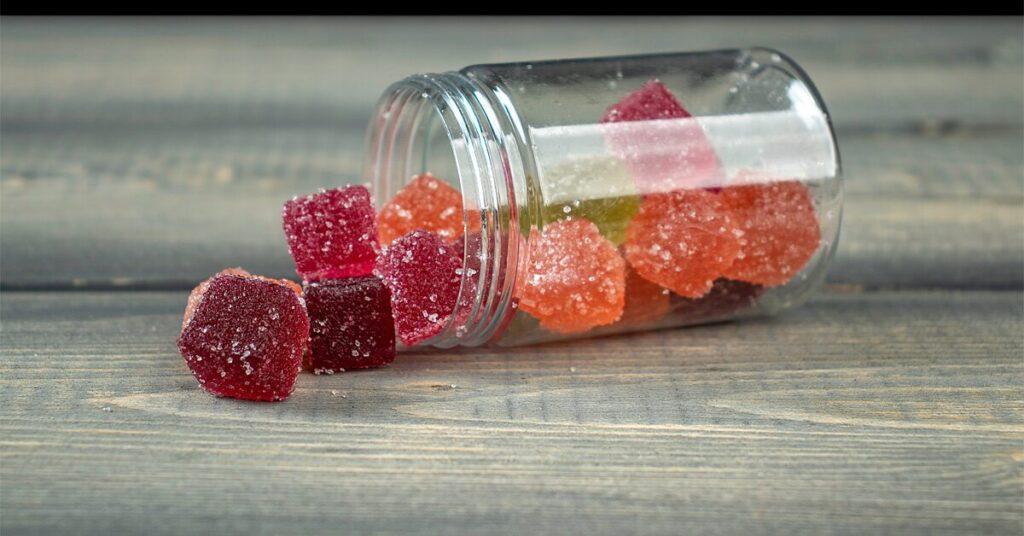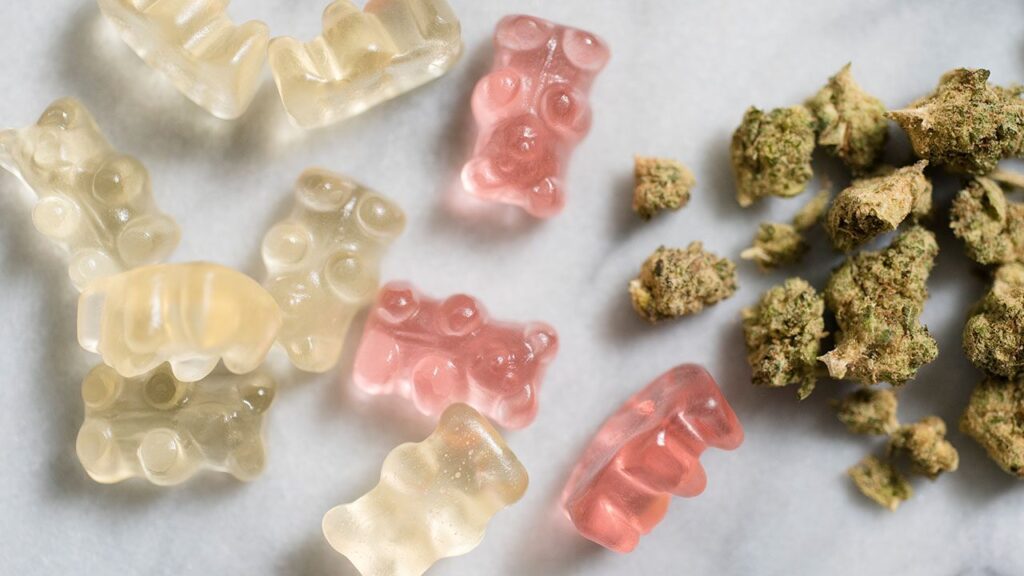Confused between CBD gummies and THC edibles? Learn the key differences, effects, legal status, benefits, and which is right for you in our detailed guide.
Introduction
Understanding the world of cannabis edibles can be confusing, especially when faced with products labeled CBD gummies and THC edibles. Both are growing in popularity due to their convenient form and therapeutic potential, but they serve different purposes and create vastly different experiences. This guide aims to explain CBD Gummies vs. THC Edibles: What’s the Difference? so you can make an informed decision about which might suit your needs best.
What Are CBD Gummies?
CBD gummies are edible products infused with cannabidiol (CBD)—a non-psychoactive compound derived from hemp or cannabis plants. They offer a tasty and discreet way to consume CBD and are commonly used for:

- Reducing anxiety
- Managing pain
- Improving sleep
- Supporting general wellness
Because they do not contain THC in high amounts (usually less than 0.3%), CBD gummies do not make you feel high. They are legal in many regions, especially where hemp-derived products are permitted.
What Are THC Edibles?
THC edibles are food products containing tetrahydrocannabinol (THC), the main psychoactive component of cannabis. Unlike CBD, THC produces a euphoric high, making it popular for recreational use. THC edibles can also be used medicinally to:

- Alleviate chronic pain
- Stimulate appetite
- Aid with insomnia
- Reduce nausea in chemotherapy patients
Because THC is psychoactive, edibles that contain it are strictly regulated and are only legal in places where recreational or medical marijuana use is allowed.
CBD Gummies vs. THC Edibles: Key Differences
To help break down the differences clearly, here’s a comparative table:
| Feature | CBD Gummies | THC Edibles |
|---|---|---|
| Main Ingredient | Cannabidiol (CBD) | Tetrahydrocannabinol (THC) |
| Psychoactive? | No | Yes |
| Legal Status | Legal in many regions | Legal where cannabis is permitted |
| Medical Uses | Anxiety, pain, sleep, wellness | Pain, nausea, appetite, insomnia |
| Recreational Use | No | Yes |
| Side Effects | Mild (e.g., drowsiness) | Strong (e.g., paranoia, euphoria) |
| Onset Time | 30-60 minutes | 30 minutes to 2 hours |
| Duration | 4-6 hours | 6-8 hours |
How Do They Work in the Body?
CBD Interaction
CBD works by indirectly interacting with the endocannabinoid system (ECS). Instead of binding to receptors like THC, CBD influences the system to enhance its regulation of mood, sleep, inflammation, and pain. It’s often described as calming without altering your mental state.
THC Interaction
THC directly binds to CB1 receptors in the brain, producing psychoactive effects. This interaction is responsible for the “high” feeling but can also cause anxiety or paranoia in some people, especially with higher doses.
Effects and Benefits: What to Expect
Benefits of CBD Gummies
CBD gummies are often praised for their therapeutic effects without intoxication. They are especially suitable for people who want:
- Daily wellness support
- Relief from anxiety or depression
- Improved sleep cycles
- Help with inflammatory pain
- Non-addictive alternatives to pharmaceuticals
Benefits of THC Edibles
THC edibles, while psychoactive, are beneficial for certain medical conditions. Some reported benefits include:
- Euphoria and relaxation
- Pain relief for severe conditions
- Appetite stimulation for people with eating disorders or undergoing chemo
- Better sleep in individuals with chronic insomnia
However, they must be used carefully due to delayed onset and long-lasting effects.
Are They Legal?
CBD Gummies Legality
CBD gummies made from hemp-derived CBD (less than 0.3% THC) are federally legal in the U.S. under the 2018 Farm Bill, although some states have stricter rules.
THC Edibles Legality
THC edibles are only legal in states or countries that have legalized recreational or medical marijuana. You must be of legal age and possibly possess a medical marijuana card depending on your location.
Side Effects and Safety
CBD Gummies
Generally considered safe with minor side effects:
- Dry mouth
- Drowsiness
- Digestive discomfort
- Interactions with other medications
THC Edibles
THC edibles are potent and should be taken with caution, especially by beginners. Possible side effects include:
- Paranoia or anxiety
- Impaired coordination
- Increased heart rate
- Overconsumption due to delayed onset
Which One Should You Choose?
The choice between CBD gummies vs. THC edibles depends on your personal goals, tolerance, and legal access.
Choose CBD Gummies if:
- You want to avoid feeling high
- You’re seeking natural relief for anxiety or pain
- You’re interested in daily wellness supplementation
- You live in a state where cannabis is not legalized
Choose THC Edibles if:
- You are looking for a stronger effect
- You are treating serious medical conditions
- You enjoy the recreational high
- You live in a cannabis-legal region
Storage and Usage Tips
How to Store Edibles
Both types of edibles should be stored in a cool, dark place. Exposure to light and heat can degrade cannabinoids over time. Child-proof containers are essential to avoid accidental consumption.
Dosing Guide
Start low and go slow, especially with THC edibles. A common beginner dose is:
- CBD: 10–25 mg per gummy
- THC: 2.5–5 mg per serving for beginners
Overconsumption of THC can lead to intense, uncomfortable experiences.
FAQs About CBD Gummies vs. THC Edibles
1. Can I take CBD gummies and THC edibles together?
Yes, but it’s best for experienced users. The combination is known as the “entourage effect,” potentially enhancing benefits.
2. Will CBD gummies show up on a drug test?
Pure CBD should not, but some full-spectrum products may contain trace THC that could show up.
3. How long do CBD gummies and THC edibles last?
CBD effects last 4–6 hours, while THC edibles can last 6–8 hours or more depending on dosage.
4. Are there age restrictions for purchasing these edibles?
Yes. Most areas require buyers to be 18+ for CBD and 21+ for THC.
5. Can I travel with CBD gummies or THC edibles?
You can travel domestically with hemp-derived CBD, but THC edibles are illegal in many places and can’t cross state lines.
6. Are vegan or sugar-free versions available?
Yes, many brands offer vegan, organic, and sugar-free versions of both CBD and THC edibles.
7. Can pets consume CBD gummies?
No, human CBD gummies may contain ingredients toxic to pets. Use pet-formulated CBD only.
8. What happens if I take too many THC edibles?
You may experience paranoia, dizziness, and nausea. Stay calm, rest, and hydrate—it will pass, but seek medical help if necessary.
9. Are CBD and THC addictive?
CBD is not addictive. THC has mild potential for psychological dependence, especially with frequent high use.
10. Do these edibles expire?
Yes. Typically within 6 months to 1 year. Always check the packaging for expiration dates.
Conclusion
When it comes to CBD gummies vs. THC edibles: What’s the Difference?, the answer lies in the effects, legality, and intended use. CBD gummies offer a safe, non-psychoactive alternative for those seeking relaxation, pain relief, or general wellness. In contrast, THC edibles provide potent effects suited for medical needs or recreational enjoyment—but they come with a greater risk of side effects and legal limitations.
Always consider your goals, dosage, and the laws in your region before choosing. Whether you’re new to cannabis or exploring new options, understanding the nuances between CBD and THC edibles helps you enjoy a safe and beneficial experience.